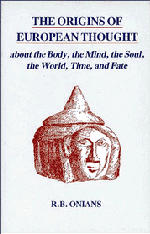Book contents
- Frontmatter
- Contents
- Preface to the first edition
- Preface to the second edition
- Introduction: The Earliest Greeks
- PART I THE MIND AND THE BODY
- PART II THE IMMORTAL SOUL AND THE BODY
- PART III FATE AND TIME
- Chapter I ‘On the Knees of the Gods’
- Chapter II Πείρατα
- Chapter III Καιρός
- Chapter IV The Weaving of Fate
- Chapter V Other Peoples—Fate and Magic
- Chapter VI Μοῖραν ἐπιτιθέναι, πεπρωμένος, etc.
- Chapter VII ʿΥπὲρ μόρον and the Relation of the Gods of Fate
- Chapter VIII The Jars of Zeus, the Scates of Zeus, and the Κῆρες
- Chapter IX Time—Ἦμαρ
- Chapter X Lachesis, Klotho, and Atropos
- Chapter XI Phases of Body and Mind, Sorrow, Sleep, Death, etc.
- Chapter XII Τέλος
- ADDENDA
- Indexes
Chapter X - Lachesis, Klotho, and Atropos
Published online by Cambridge University Press: 06 August 2010
- Frontmatter
- Contents
- Preface to the first edition
- Preface to the second edition
- Introduction: The Earliest Greeks
- PART I THE MIND AND THE BODY
- PART II THE IMMORTAL SOUL AND THE BODY
- PART III FATE AND TIME
- Chapter I ‘On the Knees of the Gods’
- Chapter II Πείρατα
- Chapter III Καιρός
- Chapter IV The Weaving of Fate
- Chapter V Other Peoples—Fate and Magic
- Chapter VI Μοῖραν ἐπιτιθέναι, πεπρωμένος, etc.
- Chapter VII ʿΥπὲρ μόρον and the Relation of the Gods of Fate
- Chapter VIII The Jars of Zeus, the Scates of Zeus, and the Κῆρες
- Chapter IX Time—Ἦμαρ
- Chapter X Lachesis, Klotho, and Atropos
- Chapter XI Phases of Body and Mind, Sorrow, Sleep, Death, etc.
- Chapter XII Τέλος
- ADDENDA
- Indexes
Summary
The original functions of the differentiated Moirai, ∧άχεσις, Κλωθώ, ῞Ατροπος, can now be explained. They have been referred by later Greeks and modern scholars to the past, present, and future (a reference which has some justification in the names of the Norns, Urðr, Verðandi, Skuld) or in the reverse order. The names lend no support to either. Their activities were originally, we may suggest, first the assigning of the portion, the λάχος or μοĩρα, by ∧άχεσις with scales as by Zeus with his, then the spinning of it by Κλωθώ, and lastly the binding or weaving of it by ῞Ατροπος. Apart from the evidence already adduced, Aeschylus provides confirmation that the λάχος was the wool to be spun:
τοũτο γὰρ λάχος διανταία
Μοīρʾ ἐπέκλωσεν ἐμπέδως ἔχειν.…
γιγνομέναισι λάχη τάδʾ ἐϕʾ ἁμὶν ἐκράνθη.
Klotho's part in the process is clear in her name. The fate has thus been allotted and made up, spun. Its bringing, fastening to the victim, i.e. the binding (or weaving) process, and ῞Ατροπος, ‘she who cannot be turned’ aside or backward, remain. Antipho speaks of τῆς τύχης…ἣν οὔτʾ ἄν ἐγὼ οὔτʾ ἄλλος οὐδεὶς οἷός τʾ ἄν εἴη ἀποτρέψαι μὴ οὐ γενέσθαι ἥντινα δεĩ ἑκάστῳ, and an inscription of the ἀμε(τά)τροπα δῶρα of Τύχη. We have seen that the ‘gifts’ of Zeus or the Μοĩραι are threads.
- Type
- Chapter
- Information
- The Origins of European ThoughtAbout the Body, the Mind, the Soul, the World, Time and Fate, pp. 416 - 419Publisher: Cambridge University PressPrint publication year: 1988



